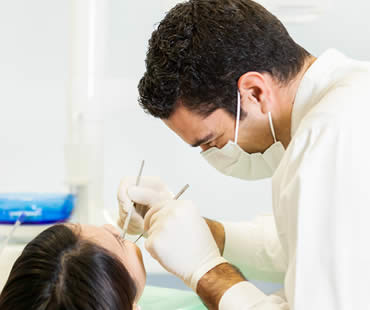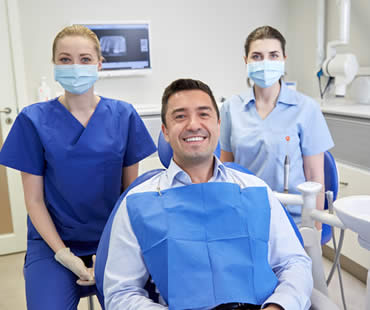
Aug 7, 2020 | Dental Topics 2, Oral Surgery, Blog
Wisdom teeth are the last adult teeth to erupt into the mouth, generally emerging between the ages of seventeen and twenty-one. They are the third set of molars and are in pairs: two each on the top and bottom arch of teeth. While some patients don’t have wisdom teeth, most do. Many of those who do have them don’t have enough room for those teeth to erupt fully, causing them to be wedged under the back of another tooth, impacted in the gum.
Impacted wisdom teeth are very difficult to clean, and can negatively affect the surrounding teeth. They are highly vulnerable to disease and decay and may lead to tooth pain and damage to adjacent teeth. For these and other reasons, a dentist may recommend that the teeth be extracted through oral surgery as soon as necessary to prevent any problems.
Extraction of wisdom teeth is typically an outpatient procedure done in an oral surgeon’s office. A healthy patient can proceed with a typical surgery, but if any infection is detected, the surgery can’t move forward until the infection is cleared up through the use of a full course of antibiotics. Once the surgery is moving forward, the surgeon’s team will administer some form of anesthesia to numb the area surrounding the tooth or to possibly sedate the patient through IV sedation dentistry.
After the anesthesia has fully taken effect, the surgeon makes an incision to open the gum and to remove any bone that is blocking the tooth from extraction. The tissue connecting the bone to the tooth will be separated and the tooth will be removed. In some cases, the surgeon will have to break the tooth into smaller pieces to make it easier to remove. After thoroughly cleaning the area and removing any remaining debris, the incision will be closed, stitched and packed with sterile cotton gauze to staunch any bleeding.
The surgeon will provide aftercare instructions. Patients should follow these instructions to the letter in order to ensure the best and fastest healing of the surgical site.
If you live in the Conyers area contact us today

Nov 20, 2020 | Dental Topics 2, Root Canal Treatment, Blog
Tooth decay that is allowed to become severe can cause extensive damage to your tooth, even resulting in tooth loss if not treated. Sometimes symptoms are present that cause you to visit your dentist, but other times it’s just a regular checkup that catches a problem.
The source of trouble usually begins with a small area of tooth decay that goes unnoticed. Bacteria attacks, decay thrives, a cavity may form, and infection can spread. Cavities may be filled to repair the tooth and eradicate infection, but advanced cases of decay can reach the tooth’s interior. Once it gets to the pulp, serious damage can set in. This is when symptoms often appear, sometimes becoming severe.
Once damage reaches your tooth’s pulp, some common symptoms that will prompt you to call your dentist may include:
- Slight to severe pain when biting, chewing, or even putting slight pressure on the tooth
- Minor to extreme sensitivity when your tooth comes into contact with anything hot or cold
- Inflammation or swelling near the gum line surrounding the affected tooth
- Ongoing aches in the general area of the damaged tooth, including headaches, neck aches, or earaches
- Ulcers or bumps near the damaged tooth
- Difficulty performing normal mouth functions like eating
If you experience any of these symptoms, it’s time to visit your dentist for an evaluation. Root canal therapy might be recommended to restore your tooth’s health and regain comfort and functionality. Root canal treatment involves cleaning the damaged areas of the tooth pulp to remove infection and bacteria, filling the open space, and sealing it to prevent future damage. Sometimes a crown is placed on top to complete the process.
When a tooth is severely damaged, root canal therapy provides your best chance for restoration and optimum oral health. Your dentist will effectively and safely perform the procedure, and at the same time relieve the related symptoms that you may be experiencing.
If you live in the Conyers area contact us today

Sep 14, 2018 | Dental Topics 2, Root Canal Treatment, Blog
Pain, sensitivity, and trouble eating or sleeping are only a few of the uncomfortable symptoms of a damaged tooth. Sometimes the inside portion of a tooth, or its pulp, becomes so damaged that action must be taken. It could come in the form of extracting the tooth or it might be able to be saved through root canal treatment.
Virtually every dentist recommends root canal therapy over tooth extraction. It’s almost always better to save your natural tooth. Otherwise, you’ll end up with a hole in your smile and the problems that accompany it.
A tooth can be damaged for a variety of reasons such as severe decay, trauma, or deep cavities. The damaged pulp contains nerves, which is one reason that many patients experience severe pain. Although dental fillings can remedy some cavities or decay, when the situation advances to the extent of harming the tooth pulp, fillings are not enough. Root canal treatment is usually the best way to repair the tooth without having to pull it.
A root canal procedure involves drilling into the tooth so that the pulp can be completely removed and the canal thoroughly cleaned. Then the area is filled with special material and sealed to prevent future damage. Often, a dental crown is placed on top of the restored tooth to provide added protection. This process alleviates any symptoms and give you back your fully functional, natural tooth.
If you were to opt for tooth extraction instead of root canal treatment, you’d be choosing a more invasive approach. The procedure can be intrusive, time consuming and costly. Recovery from tooth extraction can be uncomfortable and take longer than root canal therapy. Careful oral hygiene is necessary after extraction to avoid infection or complications. You’ll also be left with an unappealing hole in your smile that can make eating and speaking more difficult, and your other teeth will likely start moving into that empty space.
To determine the best treatment for you, consult a reputable dentist. You’ll learn about the options and how root canal therapy may be the best choice in restoring your oral health and your smile.
We look forward to seeing you in our Conyers dental office

Apr 2, 2021 | Dental Topics 2, Root Canal Treatment, Blog
Sometimes a tooth is so severely damaged that the only way to save it is with root canal treatment. There is no reason to turn and run if your dentist advises this procedure. The treatment has advanced to the point that it’s often compared to getting a filling. There are certain steps that will be performed as part of nearly every root canal procedure.
Preparation
X-rays may be taken as part of the diagnosis process or to determine the extent of damage. Once the dentist is ready to begin treatment, a local anesthetic will be used to numb the area throughout the procedure.
Pulp removal
A rubber dam will be placed around the tooth to separate the area from the rest of the mouth, and to keep it dry from saliva. The tooth will be opened, often using a small dental drill, to gain access to the pulp inside the tooth. The damaged pulp will be removed, and if there is an abscess it will be drained.
Cleaning and filling
After the pulp is eliminated, the dentist will thoroughly clean the area. The root canal will be widened if needed to create an adequate space for the filling. Depending on the extent of the damage, this step of the process can take up to several hours to complete or it can be spread over more than one visit. A temporary filling is sometimes used to seal the area between visits. If infection is present, the dentist may prescribe antibiotics.
Sealing
The temporary filling will be removed and the permanent filling placed to fully seal the tooth and prevent future infection. If the tooth has been filled at the root, the risk of breaking is higher so a crown may be recommended for protection.
Crown placement
Crowns help prevent further damage or fracturing. If needed, the tooth will be reduced somewhat to allow space for the crown. It will be held in place securely with dental cement.
Recovery
After root canal treatment, the tooth should survive for many years. The procedure may be repeated if re-infection occurs.
Schedule your appointment at our Conyers dental office

Sep 27, 2019 | Dental Topics 2, Root Canal Treatment, Blog
A tooth that has been damaged by decay or trauma may need endodontic treatment, also called root canal therapy, in order to save the tooth. Although it may sound like a scary procedure, advances in dentistry have made it a much less painful or upsetting process than it used to be. This treatment is worth it to restore your smile as naturally as possible.
How do you know you might need endodontics? You may experience pain in the tooth, sensitivity to hot or cold foods or beverages, or swelling in the area. Severe cases may have a discharge of pus near the tooth. However, not all cases of a badly damaged tooth result in noticeable symptoms. That’s one reason it’s important to maintain regular checkups with your dentist, who will pick up on problems with a tooth that you may not realize is damaged. Examination and testing such as X-rays can help diagnose a tooth that is in dire need of repair.
When possible, dentists strive to save your real tooth. Sometimes the best way to do that is through root canal therapy, which involves removing the damaged tooth pulp from the interior of the tooth. Using local anesthesia to make you comfortable, the dentist or endodontist uses special tools to enter the root canal, remove the pulp, and clean the area thoroughly. Once the tooth is ready, a crown is usually placed on top of the existing tooth to protect it from future damage and to complete the process. Sometimes antibiotics are prescribed if an infection was present to help ensure that you are in the best of health.
Endodontic treatment is often compared by patients to simply getting a regular tooth filling. The procedure is usually completed in one office visit and it won’t be long before you are back to your normal routine, with a fully restored natural tooth in your smile.
Schedule your appointment at our Conyers dental office

Jul 30, 2021 | Dental Topics 2, Root Canal Treatment, Blog
Have you been told that you may need a root canal treatment? Are you worried because of things you’ve heard in the media about how “awful” a root canal is? Don’t worry about what you’ve heard; endodontic therapy isn’t at all what you’d think. Let’s debunk some myths!
- Myth #1: Root canal treatment is very painful. This isn’t true! In fact, a root canal treatment is performed specifically to relieve a patient’s pain, not to cause more. After a root canal treatment, you might feel some tenderness, but the pain you felt when the damaged tissue and infection was still inside the tooth will be completely gone. Once the swelling from the procedure has gone down, you will be able to use your new tooth exactly the way you could use your natural tooth when it was completely healthy.
- Myth #2: Root canal therapy or other endodontic work can lead to disease elsewhere in the body. Another falsehood! Root canal treatments don’t spread disease to the rest of the body, rather, they remove infected tissue and bacteria from the body, preventing the affected tooth from becoming re-infected.
- Myth #3: Extraction is better than root canal treatment. Extraction is not preferred to root canal treatment! Whenever possible, it’s preferred to keep your natural tooth. Your natural tooth’s roots stimulate and preserve the bone of your jaw, as well as providing adequate support to the surrounding teeth. Dental implants or dental bridges can be problematic, both in function and in dietary restrictions. In fact, an extraction can lead to several prolonged appointments to perform replacement procedures, treatments that are far more involved than a root canal treatment.
Endodontic treatment is an extremely common dental procedure that can provide durable, long-lasting restorations that will function as your natural tooth did. If you believe you may need a root canal treatment, talk to your endodontist or dentist today to see how this successfully proven treatment can help you and your smile needs.
We treat patients from Conyers and the surrounding area






